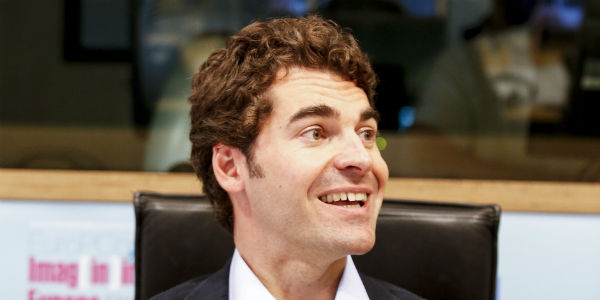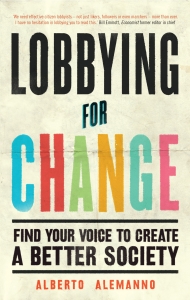Interview | Alberto Alemanno on how lobbying can be a force for good
Do you believe that lobbyists can be a force for good? Alberto Alemanno, author of Lobbying for Change: Find Your Voice to Create a Better Society, is on a mission to convince ordinary people of their power to lobby for change. In this interview with Barbara Aubin, he reflects on the importance of engaging with our political representatives, holding them accountable and lobbying for the causes we care deeply about as fundamental elements of a healthy democracy.

Alberto Alemanno. Photo: European Committee of the Regions. Copyright European Union/ Wim Daneels via a CC-BY 2.0 licence
Lobbying for change as a new theory and practice of active citizenship
 Q: When did you realise you wanted to do more to bring about positive change in the world?
Q: When did you realise you wanted to do more to bring about positive change in the world?
It happened over time; there’s not been a sudden epiphany. The book reflects my experience as a citizen and an academic who felt frustrated in his ability to convey the expertise he had accumulated to society itself. This led me to wonder how many citizens felt the same. I thus experimented with unconventional forms of teaching such as online teaching through iTunes and massive open online courses (MOOCs), which – by reaching more than 200,000 individuals – have democratised access to my classes. I embraced these methods to inspire citizens coming from different walks of life to action. Since then I have been accompanied by, and worked closely with, various communities of committed individuals, well beyond my students, to serve society by providing advice to NGOs.
These experiences led me to theorise and foster a model of active citizenship that, by making it modern and sexy, beautifies civic engagement. This is how Lobbying for Change came about. Besides the new theory, it offers a collection of stories from successful citizens’ lobbyists around the world as well as a practical guide for anyone looking to replicate those.
Q: Lobbying is often portrayed as being conducted by large international firms spending millions and employing hundreds of professional lobbyists to influence policymakers. Do you think that expertise and affluence are prerequisites to impactful lobbying in our societies?
Not necessarily. Historically, lobbying has been a prerogative of big corporations and organised groups, including trade unions and large civil society organisations, who have been investing resources and hiring experts. Today the tools for influencing the policy process have been democratised by the digital revolution, which makes them easily available to anyone, and their use is even encouraged by governments. However, empirical evidence suggests that citizens tend to not use them or simply ignore their existence. Indeed today, 75 per cent of the meetings between policymakers and external actors in Europe, both at the national and EU level, entail corporate interests. Interest representation in the policy process today is a ‘David and Goliath’ scenario in which citizens have no voice and their influence is therefore statistically insignificant.
Becoming a citizen lobbying might provide anyone an opportunity to learn about the policy process, thus playing a unique pedagogical role. The objective is to bring citizens closer to the decision-making by showing that many different tools do not only exist, but might actually work for their best interest. By doing so, citizen lobbying has the potential to act as a social equaliser by countering the undue influence exercised by the usual suspects. This argument is supported by research suggesting that societies inhabited by assertive citizens tend to be more transparent and accountable.
Q: As a lawyer yourself, participation in pro bono legal work seems to have penetrated the culture of the legal profession. Why this isn’t the case in the lobbying world?
Historically, the legal profession has been devoting time to society. In the old days, lawyers were not even paid; they were fortunate individuals mobilising their rhetorical skills and talents to help the less privileged on a pro bono basis. However, the neoliberal culture driving the legal profession has partly stripped it of its inherent commitment to social justice. We are currently witnessing a resurgence – especially among major law firms and legal departments of major companies – of the pro bono commitment, which is often aligned to the corporate social responsibility (CSR) of these organisations. But this isn’t the case in other professions. Professional lobbyists tend to go where they are paid the best and this is certainly not in the NGO sector.
But I see the desire of the younger generations of professionals to devote some of their time to causes they deeply care about. And they expect to do so during office hours. To address and foster such a growing demand, I’ve initiated ‘The Good Lobby’, a pioneering, advocacy sill-sharing community. We encourage and enable academics, lawyers and other professionals, including professional lobbyists, to provide pro bono services to NGOs and civil society organisations by mobilising the same repertoire of tools they use when helping corporations.
The future of the business, government and civil society relationship lies in these unconventional forms of collaboration. Building bridges among communities who hardly talk to one another, but often oppose one another based on a set of rather biased and polarising dynamics. Academics, lawyers and other professionals suddenly find themselves exposed to the policy process and cooperate with NGOs who need their advice to develop and sharpen advocacy strategies to pursue their mission. In less than one year, we have managed to match the demand for expertise and the supply of it to support many different projects which have prompted systemic societal change. These include to afford whistleblowing protection across Europe, to complain against unpaid internships and, more recently, to contribute to rendering transparent the upcoming Brexit negotiations.
Q: Digital technologies have revolutionised our daily lives and billions of people are active on social media. How can you explain that while these should have offered massive opportunities for democracy by connecting politicians with their citizens, the gap seems wider than before?
This is absolutely accurate. The democratising promise which has accompanied the penetration of the internet has been revealed as largely illusionary. While it has made us content creators and political messengers, it has also condemned us to become passive spectators of a show that is driven by few economic actors. Think of the many social media platforms that have been commodifying the experience of citizen engagement and participation by transforming themselves into data-brokers collecting ‘likes’, ‘shares’ and ‘signatures’ for online petitions. While these micro-donations give us a feeling of engagement vis-à-vis our friends and may shape our modern collective actions, they are – when measured against the individual ability to contribute to society – meaningless. This is where the internet as a democratising force has to be adjusted by using it as a means and no longer as an end in itself.
Connecting citizens with policymakers via social media is becoming an unavoidable need to overcome the current disconnect. Yet there are uncertainties on how to actually do that in a viable way. Up until now, two major actors have occupied that space: on the one hand, we have the self-proclaimed direct democracy movements (i.e. Podemos, Five Stars Movement) who have tried to reconnect with their own base by reflecting on what they want, but as we know, they haven’t been very successful in delivering on that promise.
On the other hand, online petition platforms have been extremely successful in mobilising in short periods of time. However this type of participation fails to take full advantage of the expertise and talents of citizens and does not transform their desire for participation into meaningful action that would reinforce their feeling of belonging to society. Finally, traditional political parties have not occupied that space yet, because they tend to be digitally averse and are critically afraid of social media exposure backfiring.
Q: Considering Brexit, the election of Donald Trump in the US and the unprecedented result for Marine Le Pen in France, it seems that hate, racism and fear are unfortunately powerful drivers of citizen unity. But do you think that the right cause can still unite citizens?
I definitely do. As populist forces are there to stay, their epiphany, success and major arguments need to be carefully understood and urgently addressed. Current research shows that most of the citizens supporting these movements, including Brexiteers, tend to not necessarily share the statements made by their own politicians. However, due to their growing feeling of cultural homelessness, they no longer feel a sense of belonging to their community. Therefore they step back from the values that have traditionally characterised their society and use their voting rights as an opportunity to convey a warning message.
As soon as we identify and process the drivers behind the populist movements, we realise that there is hope to address their legitimate concerns. In so doing, it is possible to bring disillusioned, culturally homeless and angry citizens back to the centre of the system. This entails working on the roots of that radicalisation, which include discriminations affecting them on a daily basis, too often viscerally.
Q: The EU is widely criticised for its so-called ‘democratic deficit’. Do you think that the real issue is the lack of European citizens’ lobbyists?
Everybody seems to agree that the future of the European project lies in the hands of the citizens. Following Emmanuel Macron’s presidential victory, we know that it is actually possible for a political force to unleash, tap on and even electorally capitalise on pro-EU sentiment. Yet this might not suffice to overcome today’s increasingly polarised debate about the role that Europe might play in their communities and countries.
I don’t believe that ‘the democratic deficit’ is the best way to depict the European Union. Indeed, when looking at its day-to-day functioning, the EU administration and decision-making are on average more transparent and accountable than member states and often empower citizens vis-à-vis their own national authorities. The problem is that those avenues of participation tend to be underused and, what is worse, largely unknown. Unfortunately, they do require literacy as well as an understanding of European policymaking that is generally absent after decades of EU-bashing by national politicians.
Today, citizens are not only expected to send a signal of support to their national leaders who still believe in the EU project, but they have to advance that project by themselves. Citizens lobbying might be a way to incentivise people to take action and make a difference in their community by actually using those avenues of participation which the EU has created to their benefit. This requires a cultural change: to demystify lobbying as an instrument of the few and, by democratising it, to turn it into an instrument for the many. We need more – not less – lobbying in our societies, provided that everyone may get a seat at the table.
This post represents the views of the author and not those of Democratic Audit. It first appeared at the LSE Review of Books.
Barbara Aubin is an LSE alumna and currently working in Public Affairs at the London School of Economics. She is also the Head of Content at the 1989 Generation Initiative.





 Democratic Audit's core funding is provided by the Joseph Rowntree Charitable Trust. Additional funding is provided by the London School of Economics.
Democratic Audit's core funding is provided by the Joseph Rowntree Charitable Trust. Additional funding is provided by the London School of Economics.